- Home
- Cynthia Hand
The Last Time We Say Goodbye Page 14
The Last Time We Say Goodbye Read online
Page 14
I’m going to MIT. Okay. Yes. This is what I wanted. Yes. This is, without a doubt, the most awesome thing ever to happen to me. Yes. Yes.
But that will mean leaving Mom all alone in this house.
I sit down on the living room couch and read the letter again. I force myself to imagine it: me standing at a blackboard at MIT, going all Will Hunting on some problem, me curled up on a twin bed in a tiny-but-mine dorm room, reading about quantum mechanics, me strolling along some tree-lined sidewalk, chatting with the other students, a stack of heavy books under my arm.
It’s nice, thinking about the future as something that won’t entirely suck.
But things are different now than they were when I filled out my college applications.
March 5. I haven’t told my parents. Not Dave, when we had our session yesterday. Not my friends. I don’t know how to slip it into the conversation at school. I guess it should be as simple as Guess what? I got into MIT. Hooray-hooray! But whenever that pause happens, when I could make the announcement, I choke.
If I tell people, they’re all going to watch me for my super-elated reaction. And I’m not Beaker; I’m no great actress. I’m happy I got into MIT, I am. But I don’t know if I can do happy at this stage in my life. Not in public. Not at the level they’re all going to expect.
Still, I bring the acceptance letter with me, tucked in with the Ashley letter in the front pocket of my five-subject notebook, and every now and then I open the notebook and stare at the envelope and think of all the promises collected in this one place, all the hope.
Maybe that’s it, what’s holding me back from telling people—the hope.
I’m not used to hope anymore.
It’s hardest to hold the MIT news inside me during calculus. We’re learning how to find volumes of rotations using integrations, and Steven is up at the board writing out these gorgeous equations, his handwriting so much neater than mine and so much more careful, which is why Miss Mahoney called him up there, so he could show us the answer the way a painter might create a still-life that looks like:
“So,” Miss Mahoney says when he’s nearly finished. “Let’s say Steven is a glassblower, crafting a vase. He could use this method to understand the different shapes he’s making and the amount of water the vase would hold.”
“Yeah, Steven,” El snickers. “You’re a glassblower.”
He grins and shrugs one shoulder. “It’s a job.”
“What kind of vase are we talking about, here?” pipes up Beaker. “What color of glass? I’ve always been fond of blue glass. Can you do a blue glass vase for us, Steven?”
“All righty,” he says, and turns back to the board. “Blue glass coming up.”
The class laughs, and we understand it’s a tad lame, but I’ve always appreciated the way Miss Mahoney tries to give us real-world applications for the things we learn, so it’s not just math in a box. She wants us to see the beauty in the equations, how absolutely cool it all is, but she also wants it to be real for us. It never fails to amaze me, in these moments, that the numbers explain something tangible and true about life. The numbers make sense of things. They make order of a disordered world.
I want to say thank you to Miss Mahoney. For giving me that. For trying to make it fun and not just “neat,” unnecessary knowledge.
I want to say, Hey, Miss Mahoney, I got into MIT.
Then I want to tell Beaker. And El. After all the daydreaming we did. MIT is a real place, and I am going there. I’m going there.
I want to tell Steven.
But I can’t find the words.
Words were never really my forte.
17.
WHEN I GET HOME I FIND MOM’S CAR in the driveway. That’s twice now that she’s been home when she’s supposed to be working. I go inside and call for her, but she doesn’t answer. Some part of me goes into panic mode, and I run to her bedroom, holding my breath until I can confirm that she’s not sprawled across the bed with her arm trailing off the mattress, a spilled bottle of pills scattered on the carpet.
Where did I get that image, I wonder, the go-to scene of fatal overdose that you always see in movies? Why did my mind go straight to the worst possibility?
Because it happened, I answer myself. The worst possibility already happened once. It could happen again.
“Mom?” I yell.
There’s no answer. I check Mom’s bathroom, Dad’s office, and the kitchen without success, which gets the adrenaline flowing again.
She could be out with a friend, I reason. Then I come across her purse on the kitchen counter, her phone inside it. Her coat is slung across a kitchen stool. Everything here but nothing in its proper place.
“Mom!” I scream. “Mom!”
I stand still for a minute, holding my breath, listening. Then I hear it.
Music. Very faint music.
Coming from downstairs.
I find Mom in Ty’s room. Led Zeppelin is pouring out of Ty’s clock radio: “Stairway to Heaven,” a song that he and Patrick and Damian used to play on a constant loop back in middle school, again and again and again until Mom and I could have sung the lyrics in our sleep. Mom is standing with her back to me, hands pressed to a Kevin-Durant-making-a-slam-dunk poster on the far wall.
My heart sinks. She’s taking down his room.
It was going to happen at some point, I suppose.
“Hi,” I rasp. “I was looking everywhere for you. Did you hear me calling?”
She shakes her head. Her small shoulders are trembling. She’s crying again.
“Are you okay?” I ask.
“I’ve been better.” She takes a deep breath and then smooths the poster down, pinning a corner with a gold thumbtack.
She’s putting it back up, I realize. Not taking it down.
I scan the room and spot a large cardboard box near the bed that contains more of Ty’s stuff: his basketball jersey, a mason jar of fifty-cent pieces he collected from the tooth fairy, a tie he wore to church sometimes, a belt, his baseball cards.
“There’s a lady who’s sure all that glitters is gold, and she’s buying a stairway to heaven,” intones Robert Plant.
The smell of Ty’s cologne is so heavy it makes me want to cough.
“Mom, what’s going on?” I ask.
She wipes at her face. Then she reaches and turns down the music.
“I called in sick.” She goes to the box and removes another poster—The Hangover Part II—and goes about realigning it in its former place on the wall. “Could you help me?”
I unfreeze my feet and hold the paper up for her as she carefully guides the tacks back into their original holes.
“Redecorating?” I venture.
“Gayle was here. She brought that.” Mom indicates the box. “She thought . . . it was time . . . for me to pack up . . .” She bends her head, gasps for air as the tears drop into the carpet. “Tyler’s things. She said it would help me . . . move on.”
I bite my lip to keep from bursting out with furious words for Gayle. How dare she, I think. How dare she come here and decide what’s best for everyone?
“Gayle wants me to sell the house,” Mom continues. “She wants me to move to Lincoln, closer to the hospital so it’s not so much trouble to drive in to work. She says I should get a smaller place, since Tyler’s gone and you’re going off to school and it will only be me. She also wants me to take a new job that’s come up in the neonatal intensive-care unit—work with the babies instead of having to deal with all the people who keep dying on me in the surgical wing.”
“Sounds like Gayle has it all figured out.” I sit on the edge of Ty’s bed.
Mom reaches into her pocket for a crumpled-up tissue. She blows her nose and goes back to the box, where she takes out an old catcher’s mitt, from when Ty was in Little League.
“Where did this go?” she whispers. Her eyes dart around the room. “I can’t remember.”
“Top right corner of the bookshelf,” I answer automatic
ally.
She nods. “That’s right. Of course. You always had such a perfect memory. A photographic memory.”
She makes no move to return the glove to its place. She stands there holding it, rubbing her fingers along its smooth leather surface.
“I volunteered to coach T-ball that one year, do you remember?”
I remember.
“I got this book called Coaching Tee Ball: The Baffled Parent’s Guide. I didn’t know anything about baseball.”
“You learned.”
“Tyler was mortified to see me standing up there in front of everybody with that book.”
“He got over it.”
She stares at the mitt. “I tried,” she says after a minute.
“I know.”
“No, I mean, I tried to do what Gayle said. I tried to take it all down, put it away. I even thought about calling his friends and asking them if they would want some of it. But . . .” She takes a shuddering breath. “I can’t. I can’t let go.”
She starts crying for real now, in big, gasping sobs. I jump up to hold her.
“I can’t,” she cries against my shoulder. “I can’t.”
The hole opens up in my chest and I cling to her, and it’s as if the pain passes back and forth between us, until she goes limp in my arms.
I guide her to sit down on the bed.
“I have big news,” I say softly. “Good news.” Because we could both use some good news right now.
She looks up at me, bewildered, tear-streaked. “What?”
“I got into MIT.”
Her face opens up like a flower in the sun. She pulls away and stares at me for several moments, not talking, just looking at me with an expression that says maybe there is a God after all. Who has answered her prayers.
“I’m glad,” she whispers when she regains her powers of speech. “I’m so glad, Lexie.”
I try to smile. “Me too.”
“Now you can go,” she says fiercely.
“I can go?” I don’t understand.
She takes me by the shoulders and gives me a gentle shake. “You can build a new life for yourself. That’s what I want, for you to get away from this place. I want you to go to Massachusetts and never look back.”
She says it like we’re the last people in line for a lifeboat on a sinking ship, telling me to leave her. Telling me to let her drown.
“It doesn’t have to be like that,” I croak. “You can build a new life for yourself, too.”
She lets go of me and turns away. “No. My life is over.”
I’m shocked to hear her say it that way. She was always an optimist, before. Even when Dad left, after she got over the initial shock, she kept saying, “He’ll come to his senses. He’ll come back. We’ll go along the best we can until then. This isn’t the end of the world.” Even though it clearly was. The end of our world, anyway.
And now she’s saying her life is over.
“Mom . . .” I don’t even know where to start.
She’s not looking at me anymore; she’s staring at the mirror with the Post-it and the words below empty.
“You’re not dead,” I say, my voice sharper than I mean it to be. “You’re alive. It’s hard now but . . . you’ll heal. You can still be happy, someday.”
She goes to the bookshelf and returns the catcher’s mitt to its proper place. “No, sweetie,” she says in her official parenting voice, like I’m ten all over again and she’s telling me the facts of life. “I’ll never be happy. How could I, when he’s not here? When I have failed him this way? No. No. I will not heal from this. My life is over,” she says. “If you weren’t here I’d . . .” She trails off.
“If I wasn’t here, you’d what?”
She shakes her head. “Nothing.” She tries to give me a reassuring smile. “Don’t worry about me, Lexie. I’ll be fine. I won’t be happy—I can’t be—but I’ll be fine.”
I watch in silence as she continues unpacking the box, helping her find where an item belongs if she doesn’t remember. Then there’s only one thing left to deal with: the collage frame that Ty filled up in the days before he died, the one with the pictures of his friends and family.
That doesn’t have a place where it belongs. After the funeral somebody stuck it behind his bedroom door, and it’s been there ever since.
Mom lays it on the bed and looks at it.
“I don’t know what to do with this. I could take the photos out and send them to the people in them, but I can’t remember their names. Isn’t that silly? I honestly don’t know who most of these people are.” She points to a picture on one edge. “I remember Damian and Patrick. The three amigos, I used to call them. And I remember the boys he played with when he was in elementary school. But his friends now . . . I was in nursing school by then. I didn’t pay as close attention as I should have. I don’t know them. What kind of mother am I, that I didn’t know his friends?”
“It’s okay, Mom.”
She shakes her head. We stand for a few minutes looking at the pictures. One depicts Mom giving Ty a bath when he was just a baby, which seems odd, that he would want people to see that picture, but Mom is so beautiful in it. She’s wearing curlers and a plaid shirt with the sleeves rolled up, one hand cupping Ty’s round baby head, the other dragging a washcloth over him. She’s looking up into the camera with half a smile, chagrined to be caught so undone, and she looks incredibly young and vibrant and, at the same time, maternal and sweet. She looks like a different person from the woman standing beside me now.
In another corner I spot the picture Mom took of Ty and me the night of homecoming, me in my green dress, Ty in his tux and his flawlessly makeup-covered forehead. He wanted people to see that, too. Us together. His arm around me. That’s something. It’s not an explanation or a goodbye, but it’s something.
And suddenly it hits me: the missing photographs. This is where Ty must have put the missing photographs.
I scan the collage again, but there’s no picture of Ty and Dad hunting. No picture of Dad at graduation. No picture of Dad here at all.
Like she can read my mind, Mom points to an empty slot in the collage, the only empty slot, which makes it seem deliberately empty. I noticed it at the funeral, but didn’t give it too much thought. Now, though, Mom is looking at it with a sorrowful expression.
“Your dad should have gone here,” she murmurs. “That was cruel of Tyler, leaving him out.”
Cruel is not a word that I would ever use to describe Ty.
“Dad probably didn’t even notice,” I say.
“He noticed.” Mom touches her finger to the glass. “I watched him that day, keeping in the back of the church, out of our way, because he wanted to stay by . . .” Her lips tighten. “But near the end, when the crowd was thinning, he came up and looked at this. He went from picture to picture, looking. And he never found himself there.”
“Maybe Dad doesn’t deserve to be there,” I argue.
She sighs. “Maybe not. But you should have seen his face when he realized he wasn’t included. He looked about as hurt as I’ve ever seen him. Then he just put his hands in his pockets and walked away. It was cruel. I didn’t think Tyler had that kind of vindictiveness in him.”
“Ty was angry,” I said. “He had every right to—”
Mom lifts her hand to stop me. “I know. I just wish he hadn’t ended things that way.”
I chew on my bottom lip, thinking. I look at the collage again, and then I suddenly notice that right in the middle, in a place of prominence, even, there’s a picture of Ashley Davenport. Not the homecoming picture of Ty and Ashley, but a black-and-white candid shot, taken by someone who was obviously trying to be artsy with the camera. It shows Ashley and two other cheerleaders in what must have been the seconds right after the basketball team made a basket, wearing their uniforms, smiling and jumping for the crowd in the background, their eyes bright, so full of action even in the picture that I can almost hear their shouts.
Mom sees w
hat I’m looking at. “They’re so pretty, aren’t they?” she says. “Teenage girls are at the height of pretty, like flowers just as they bloom.”
I cock my head at her. “Me too? Am I a flower?”
She gives me an attempt at a smile. “You’re a flower.”
“Did you know this girl?” I ask, tapping the glass over the cheerleader photo.
“She was Tyler’s girlfriend,” Mom says. “Ashley. He brought her over to the house for dinner once.”
My mouth falls open. “He did? Where was I?”
“A Math Club competition, if memory serves.” She sighs, remembering. “We had pot roast I made in the slow cooker. She actually brought an apple pie that she baked herself. She was lovely, inside and out, that girl. You could see it in her. A good girl. Sweet. Just the right kind of girl for Tyler to be with.”
She looks away.
“Do you know why they broke up?” I ask softly.
She shakes her head. “He didn’t tell me.”
“I thought she dumped him, but . . .” My gaze returns to the picture. “I guess he wasn’t too mad at her if he’d put her picture up here.”
“I don’t know if you could really be mad at a girl like that,” Mom says wistfully.
Wow, I think. She was imagining grandbabies and everything, it seems.
Mom’s mouth pinches up, like all this talk about Ty’s lost romantic prospects is painful to her. She picks up the collage and moves it behind the door, then takes one last long look at Ty’s room. She sighs, pulls a tissue out of her pocket, and blows her nose.
“Come on,” she says. “We’re done in here.”
She turns out the light.
5 March
I don’t know why, maybe because I love torturing myself, but I keep going back to the first day Steven and I were officially together. Not to the bookstore, or the date, or the kiss after, although I think about those things often enough, my own personal memory playlist that’s on a continuous loop, but to a conversation I had later about Steven. With Ty.
After Steven dropped me off, I floated inside on cloud 9, bursting with all that had happened in the past few hours. Mom was working, so I couldn’t girl-talk with her about it. I found my brother in the basement, bowling on the Wii.

 Boundless
Boundless My Plain Jane
My Plain Jane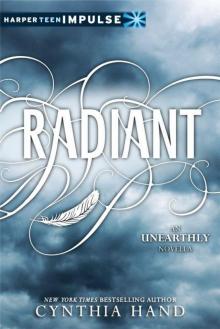 Radiant
Radiant Hallowed
Hallowed 01 Unearthly
01 Unearthly My Lady Jane
My Lady Jane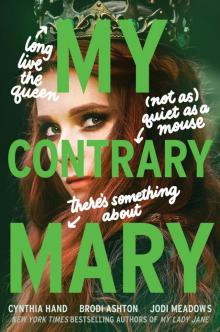 My Contrary Mary
My Contrary Mary Unearthly
Unearthly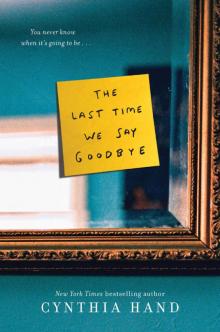 The Last Time We Say Goodbye
The Last Time We Say Goodbye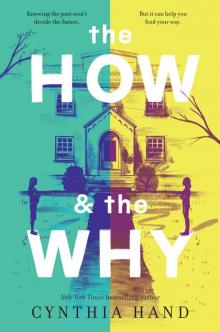 The How & the Why
The How & the Why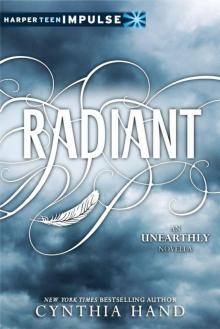 Radiant (HarperTeen Impulse)
Radiant (HarperTeen Impulse) Unearthly u-1
Unearthly u-1 Boundless (Unearthly)
Boundless (Unearthly)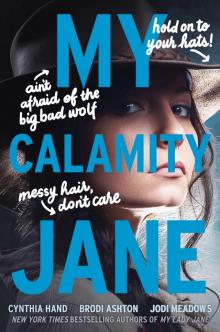 My Calamity Jane
My Calamity Jane Hallowed u-2
Hallowed u-2 Hallowed: An Unearthly Novel
Hallowed: An Unearthly Novel